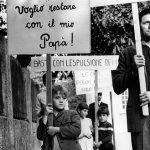 Kristina Schulz, Sarah Kiani, Magali Michelet, Carole Villiger, and Marie Bouvier: Institut d’histoire, Université de Neuchâtel (CH) (Web)
Kristina Schulz, Sarah Kiani, Magali Michelet, Carole Villiger, and Marie Bouvier: Institut d’histoire, Université de Neuchâtel (CH) (Web)
Venue: 05.-07.10.2022
Venue: Université de Neuchâtel
Proposals by: 29.04.2022
Labour migration has had a profound impact on European societies after World War II. In the context of an insatiable thirst for labour in the service of economic reconstruction, the mobility of workers from the countries of the South to the industrialised countries of the North constituted a “new intra-European migration regime” (Dirk Hoerder) which, until the 1970s, mobilised about 15 million people from the (Euro-)Mediterranean region (Italy, Spain, Portugal, Turkey, Tunisia, Greece, (former) Yugoslavia, etc.) to the industrial centres of Northern Europe. Despite the end of an active recruitment policy after the oil crisis in 1973, the “guestworker-system” continued to exist/endured until the end of the 1980s.
While some elements of what Peter Gatrell has called «The unsettling of Europe» have been studied for various and specific contexts, the social situations of the workers, and particularly their family life, have long been neglected by migration history. The limited historiography stands in contrast to an abundant sociology of the “Guestworker” since the 1970s. This reticence can be explained, among other things, by a lack of sources. The challenge is even greater when it comes to research on unauthorised family reunifications and other strategies by which the persons concerned tried to maintain family relations. Official records are silent on the placement of children in orphanages or the deportation of children without legal status (sometimes accompanied by their mothers, sometimes raised by relatives in the home country). The archives are also silent on children who lived, sometimes for years, clandestinely and sometimes even hidden in the host country. However, a set of more (or less) recent tools makes it possible to explore this history, notably oral history, the sociology of mobilisations, the socio-history of migrations, gender approaches or the notion of “transnationalism” (Green/Waldinger). Read more and source … (Web)
